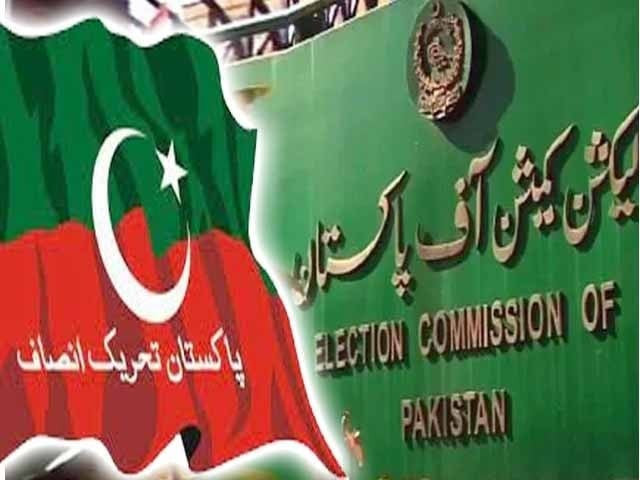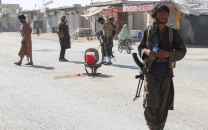ECP decides to take ‘bat’ back from PTI
Commission to file intra-court appeal against PHC order

The Election Commission of Pakistan (ECP) on Friday decided to challenge the decision of the Peshawar High Court, which suspended the declaration of PTI's internal polls as "unconstitutional" and the revocation of the party's 'cricket bat' electoral symbol.
Sources indicate that the ECP plans to file an intra-court appeal in the PHC challenging the decision of its single-judge bench. In the event of no relief, the commission intends to take the matter to the Supreme Court.
On December 22, the ECP invalidated PTI's internal elections, resulting in the withdrawal of the party's iconic "cricket bat" symbol.
“So keeping in view, the clear mandate of Elections Act, 2017 read with PTI constitution 2019, it is held that PTI has not complied with our directions rendered therein order dated 23rd November, 2023 and failed to hold intra-party election in accordance with [the] PTI prevailing constitution, 2019 and Election Act, 2017, and Election Rules, 2017,” the ECP’s written order read.
“Therefore, the certificate dated 4th December, 2023 and Form-65 filed by the alleged chairman, is hereby regretted and rejected accordingly. The provisions of Section 215 of the Election Act, 2017 are hereby invoked and PTI is hereby declared ineligible to obtain the election symbol for which they have applied for,” it added.
In the intra-party elections held earlier this month on the ECP’s order, Barrister Gohar Ali Khan was elected the PTI’s new chairman.
Gohar was nominated by Imran Khan -- the PTI’s founding chairman, who was currently incarcerated in Rawalpindi's Adiala jail.
However, on December 26, the PHC, presided over by a single judge Justice Kamran Hayat Miankhel, suspended the commission’s decision to nullify the PTI's intra-party polls and revoke its 'cricket bat' symbol.
The court in its order directed the commission to publish the PTI’s certificate on its website and restore the electoral symbol of the party.
"As elections are scheduled to be held on 8th February, 2024 and last date for allotment of election symbols is 13th January, 2024, so keeping in view the urgency that a political party has been denuded of its symbol, meaning thereby that aspirants from the general public who were willing to vote for the petitioners' party were divested of their right to vote as per their choice,” it added.
The judge further directed that notices should be issued to all the respondents for January 9 next year and the order would remain operative until then.
The ECP held a meeting following the PHC’s decision earlier but was unable to figure out its response to it.
However, the commission finally decided on Friday to challenge the PHC decision through an intra-court appeal.
According to the ECP’s legal experts, the decision of a sole judge of the PHC without hearing the commission was against the principles of justice.
ECP revises schedule for reserved seats
The Election Commission of Pakistan (ECP) on Friday made additional amendments to the election schedule, extending the scrutiny period for nomination papers of candidates on reserved seats. The scrutiny process for candidates contesting general seats is set to conclude on Saturday (today).
Returning officers (ROs) nationwide continued the scrutiny process on Friday. As per an ECP notification, the scrutiny of nomination papers for candidates on reserved seats for women and minorities will persist until January 13.
Appeals regarding paper acceptance or rejection can be submitted until January 16, with the relevant appellate tribunals deciding by January 19. Candidates have the option to withdraw nomination papers until January 22, and the finalized list of candidates will be published on January 23.
Read PML-N terms PHC decision an attack on ECP
During this period, Returning Officers (ROs) received a record 28,600 nomination papers across the country.
Scrutiny of the papers extended for the fifth consecutive day on Friday. While the majority of papers received approval from the returning officers, a few faced rejection.
Those, whose papers were rejected, included several former lawmakers elected on the Pakistan Tehreek-e-Insaf (PTI) ticket in the 2018 general election. One of them is PTI leader Murad Saeed, whose papers for NA-4 were rejected by the RO.
Others included PTI’s former National Assembly member Salimur Rehman, besides former Khyber Pakhtunkhwa Assembly members Mian Sharafat Ali and Dr Amjad. Meanwhile, objections were filed against another PTI leader Hammad Azhar’s nomination paper for a Punjab Assembly constituency, PP-171.
Rana Irfan Advocate initiated the objection, stating that Hammad Azhar was implicated in terrorism cases and he had been declared proclaimed offender in many cases. He questioned the legitimacy of the PTI leader's signed nomination papers, contending they lack authenticity.
In Mansehra, the returning officer allowed the nomination papers for NA-14 of PTI-Parliamentarian’s (PTI-P) Saleh Muhammad and the Pakistan Peoples Party (PPP) candidate Zargul Khan. Also, the scrutiny of 35 candidates for women seats and 25 minority candidates was also completed.
In Lahore, Bilawal Bhutto Zardari’s legal adviser Iftikhar Shahid submitted written reply to the objections raised to the candidature of the PPP chairman from NA-127. The reply said that the objector was not a voter of NA-127 but a resident of Narowal, adding that he lacked the standing to raise the objection.
A citizen, Muhammad Ayaz, had filed the objection to Bilawal’s nomination papers, stating that in his papers for NA 127, he pledged allegiance to the PPP-Parliamentarians (PPPP) whereas he himself was the chairman of the PPP.
In Rawalpindi, the ROs concluded the scrutiny of 119 papers. The provincial election commissioner of Sindh completed the scrutiny of the papers for the women and minorities seats in Karachi, according to a spokesperson.
Code of conduct
Meanwhile, the ECP issued a 17-point code of conduct for the national media, which included print, electronic, digital media and social media influencers. The ECP warned that legal action would be taken in case of any violation of the code.
During the election campaign, the code of conduct said, the media would not broadcast prejudiced opinions against ideology, sovereignty, security of Pakistan, judiciary and other national institutions or any statements or accusations that threatened national unity, peace.
Similarly, no content would be highlighted which were racist on the basis of gender, religion, community, any candidate, political party. Also allegation of one candidate against another candidate would be confirmed from both sides. Voter awareness programmes will be run.
The ECP said that Pakistan Electronic Media Regulatory Authority (Pemra), Pakistan Telecommunication Authority (PTA), Press Information Department (PID) and the Cyber Wing of the Information Ministry would monitor the coverage given to political parties and candidates.
It added that the Cyber Digital Wing of the information ministry would assist the ECP in implementing the code of conduct, while the government and the law-enforcement agencies would provide protection to the media representatives and houses.
The ECP prohibited the campaigning for any political party or candidate from the national treasury. Furthermore, the ECP said, the election media campaign would terminated 48 hours before the election day and the media would desist from running any exit polls, which would affect the voting.
On the election day, only accredited media representatives would enter the polling station once with a camera to shoot the polling process, but they would not take videos or pictures of secret ballots. It allowed the media representatives to observe the vote-count without cameras.
(WITH INPUT FROM APP)



















COMMENTS
Comments are moderated and generally will be posted if they are on-topic and not abusive.
For more information, please see our Comments FAQ